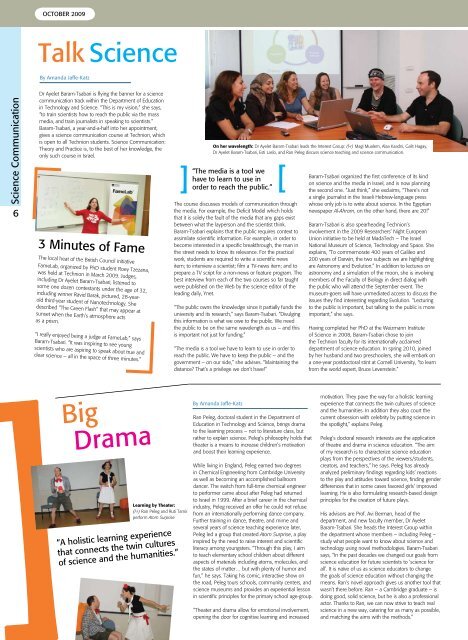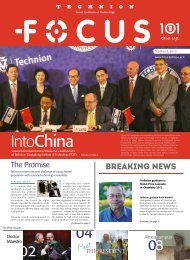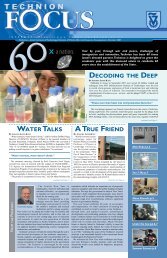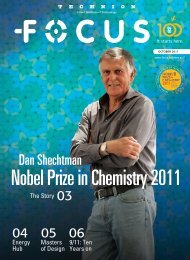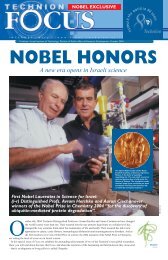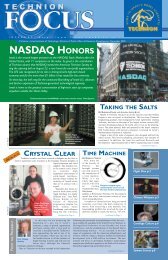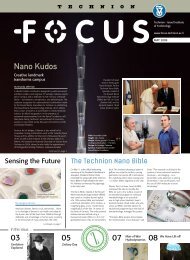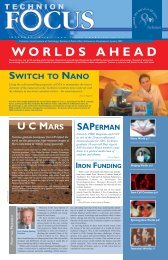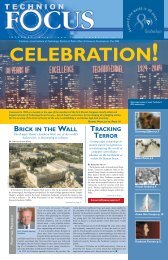Print version - Technion Focus Magazine
Print version - Technion Focus Magazine
Print version - Technion Focus Magazine
Create successful ePaper yourself
Turn your PDF publications into a flip-book with our unique Google optimized e-Paper software.
Science Communication<br />
6<br />
OCTOBER 2009<br />
Talk Science<br />
By Amanda Jaffe-Katz<br />
Dr Ayelet Baram-Tsabari is flying the banner for a science<br />
communication track within the Department of Education<br />
in Technology and Science. “This is my vision,” she says,<br />
“to train scientists how to reach the public via the mass<br />
media, and train journalists in speaking to scientists.”<br />
Baram-Tsabari, a year-and-a-half into her appointment,<br />
gives a science communication course at <strong>Technion</strong>, which<br />
is open to all <strong>Technion</strong> students. Science Communication:<br />
Theory and Practice is, to the best of her knowledge, the<br />
only such course in Israel.<br />
3 Minutes of Fame<br />
The local heat of the British Council initiative<br />
FameLab, organized by PhD student Roey Tzezana,<br />
was held at <strong>Technion</strong> in March 2009. Judges,<br />
including Dr Ayelet Baram-Tsabari, listened to<br />
some one dozen contestants under the age of 32,<br />
including winner Ravid Barak, pictured, 28-yearold<br />
third-year student of Nanotechnology. She<br />
described “The Green Flash” that may appear at<br />
sunset when the Earth’s atmosphere acts<br />
as a prism.<br />
“I really enjoyed being a judge at FameLab,” says<br />
Baram-Tsabari. “It was inspiring to see young<br />
scientists who are aspiring to speak about true and<br />
clear science – all in the space of three minutes.”<br />
Big<br />
Drama<br />
“A holistic learning experience<br />
that connects the twin cultures<br />
of science and the humanities.”<br />
]<br />
Learning by Theater:<br />
(l-r) Ran Peleg and Ruti Tamir<br />
perform Atom Surprise<br />
On her wavelength: Dr Ayelet Baram-Tsabari leads the Interest Group: (l-r) Magi Mualem, Alaa Kaadni, Galit Hagay,<br />
Dr Ayelet Baram-Tsabari, Esti Laslo, and Ran Peleg discuss science teaching and science communication.<br />
“The media is a tool we<br />
[<br />
have to learn to use in<br />
order to reach the public.”<br />
The course discusses models of communication through<br />
the media. For example, the Deficit Model which holds<br />
that it is solely the fault of the media that any gaps exist<br />
between what the layperson and the scientist think.<br />
Baram-Tsabari explains that the public requires context to<br />
assimilate scientific information. For example, in order to<br />
become interested in a specific breakthrough, the man in<br />
the street needs to know its relevance. For the practical<br />
work, students are required to write a scientific news<br />
item; to interview a scientist; film a TV-news item; and to<br />
prepare a TV script for a non-news or feature program. The<br />
best interview from each of the two courses so far taught<br />
were published on the Web by the science editor of the<br />
leading daily, Ynet.<br />
“The public owns the knowledge since it partially funds the<br />
university and its research,” says Baram-Tsabari. “Divulging<br />
this information is what we owe to the public. We need<br />
the public to be on the same wavelength as us – and this<br />
is important not just for funding.”<br />
“The media is a tool we have to learn to use in order to<br />
reach the public. We have to keep the public – and the<br />
government – on our side,” she advises. “Maintaining the<br />
distance? That’s a privilege we don’t have!”<br />
By Amanda Jaffe-Katz<br />
Ran Peleg, doctoral student in the Department of<br />
Education in Technology and Science, brings drama<br />
to the learning process – not to literature class, but<br />
rather to explain science. Peleg’s philosophy holds that<br />
theater is a means to increase children’s motivation<br />
and boost their learning experience.<br />
While living in England, Peleg earned two degrees<br />
in Chemical Engineering from Cambridge University<br />
as well as becoming an accomplished ballroom<br />
dancer. The switch from full-time chemical engineer<br />
to performer came about after Peleg had returned<br />
to Israel in 1999. After a brief career in the chemical<br />
industry, Peleg received an offer he could not refuse<br />
from an internationally performing dance company.<br />
Further training in dance, theatre, and mime and<br />
several years of science teaching experience later,<br />
Peleg led a group that created Atom Surprise, a play<br />
inspired by the need to raise interest and scientific<br />
literacy among youngsters. “Through this play, I aim<br />
to teach elementary school children about different<br />
aspects of materials including atoms, molecules, and<br />
the states of matter… but with plenty of humor and<br />
fun,” he says. Taking his comic, interactive show on<br />
the road, Peleg tours schools, community centers, and<br />
science museums and provides an experiential lesson<br />
in scientific principles for the primary school age-group.<br />
“Theater and drama allow for emotional involvement,<br />
opening the door for cognitive learning and increased<br />
Baram-Tsabari organized the first conference of its kind<br />
on science and the media in Israel, and is now planning<br />
the second one. “Just think,” she exclaims, “There’s not<br />
a single journalist in the Israeli Hebrew-language press<br />
whose only job is to write about science. In the Egyptian<br />
newspaper Al-Ahram, on the other hand, there are 20!”<br />
Baram-Tsabari is also spearheading <strong>Technion</strong>’s<br />
involvement in the 2009 Researchers’ Night European<br />
Union initiative to be held at MadaTech – The Israel<br />
National Museum of Science, Technology and Space. She<br />
explains, “To commemorate 400 years of Galileo and<br />
200 years of Darwin, the two subjects we are highlighting<br />
are Astronomy and Evolution.” In addition to lectures on<br />
astronomy and a simulation of the moon, she is involving<br />
members of the Faculty of Biology in direct dialog with<br />
the public who will attend the September event. The<br />
museum-goers will have unmediated access to discuss the<br />
issues they find interesting regarding Evolution. “Lecturing<br />
to the public is important, but talking to the public is more<br />
important,” she says.<br />
Having completed her PhD at the Weizmann Institute<br />
of Science in 2008, Baram-Tsabari chose to join<br />
the <strong>Technion</strong> faculty for its internationally acclaimed<br />
department of science education. In spring 2010, joined<br />
by her husband and two preschoolers, she will embark on<br />
a one-year postdoctoral stint at Cornell University, “to learn<br />
from the world expert, Bruce Levenstein.”<br />
motivation. They pave the way for a holistic learning<br />
experience that connects the twin cultures of science<br />
and the humanities. In addition they also court the<br />
current obsession with celebrity by putting science in<br />
the spotlight,” explains Peleg.<br />
Peleg’s doctoral research interests are the application<br />
of theatre and drama in science education. “The aim<br />
of my research is to characterize science education<br />
plays from the perspectives of the viewers/students,<br />
creators, and teachers,” he says. Peleg has already<br />
analyzed preliminary findings regarding kids’ reactions<br />
to the play and attitudes toward science, finding gender<br />
differences that in some cases favored girls’ improved<br />
learning. He is also formulating research-based design<br />
principles for the creation of future plays.<br />
His advisors are Prof. Avi Berman, head of the<br />
department, and new faculty member, Dr Ayelet<br />
Baram-Tsabari. She heads the Interest Group within<br />
the department whose members – including Peleg –<br />
study what people want to know about science and<br />
technology using novel methodologies. Baram-Tsabari<br />
says, “In the past decades we changed our goals from<br />
science education for future scientists to ‘science for<br />
all’. It is naïve of us as science educators to change<br />
the goals of science education without changing the<br />
means. Ran’s novel approach gives us another tool that<br />
wasn’t there before. Ran – a Cambridge graduate – is<br />
doing good, solid science, but he is also a professional<br />
actor. Thanks to Ran, we can now strive to teach real<br />
science in a new way, catering for as many as possible,<br />
and matching the aims with the methods.”


